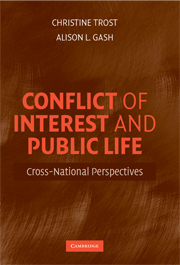Book contents
- Frontmatter
- Contents
- About the Contributors
- Acknowledgments
- Conflict of Interest and Public Life
- Introduction
- PART I THEORETICAL FRAMEWORKS
- ONE Legal Standards and Ethical Norms: Defining the Limits of Conflicts Regulations
- TWO The Watergate Effect: Or, Why Is the Ethics Bar Constantly Rising?
- THREE Pluralists and Republicans, Rules and Standards: Conflicts of Interest and the California Experience
- FOUR A Democratized Conception of Political Ethics
- PART II CROSS-NATIONAL CASE STUDIES
- Bibliography
- Index
FOUR - A Democratized Conception of Political Ethics
Published online by Cambridge University Press: 31 October 2009
- Frontmatter
- Contents
- About the Contributors
- Acknowledgments
- Conflict of Interest and Public Life
- Introduction
- PART I THEORETICAL FRAMEWORKS
- ONE Legal Standards and Ethical Norms: Defining the Limits of Conflicts Regulations
- TWO The Watergate Effect: Or, Why Is the Ethics Bar Constantly Rising?
- THREE Pluralists and Republicans, Rules and Standards: Conflicts of Interest and the California Experience
- FOUR A Democratized Conception of Political Ethics
- PART II CROSS-NATIONAL CASE STUDIES
- Bibliography
- Index
Summary
Major Strasser has been shot …
Round up the usual suspects!
Captain Louis Renault, played by Claude Rains, in the movie CasablancaIntroduction
The objective of this chapter is to sketch the contours and theoretical basis of a conception of political ethics that is expressly animated by democratic principles. The view I develop challenges the sufficiency of traditional understandings of political ethics that locate political ethics primarily in rules and norms regulating conflict of interest. Although the analysis of conflict of interest forms a legitimate and important part of political ethics, I argue that discourse about political ethics needs to be broadened and extended to encompass matters beyond issues of improper financial gain by public officials. We have reason to scrutinize the conduct not just of politicians and public servants, but also of citizens, the media, political consultants, and private businesspersons. And we have reason to include within the ambit of political ethics questions about how democratic ideals of participation, deliberation, and political equality are affected by the conduct of such actors.
Although I argue for an expansion of the contours of political ethics, the position I develop is, in important respects, complementary to conflict-of-interest research. The investigation of conflict-of-interest issues that arise in political settings is ultimately motivated by a concern for the health of democratic politics. There is a natural concern to want to determine how well democratic institutions and processes are served by various conflict-of-interest norms.
- Type
- Chapter
- Information
- Conflict of Interest and Public LifeCross-National Perspectives, pp. 76 - 98Publisher: Cambridge University PressPrint publication year: 2008

